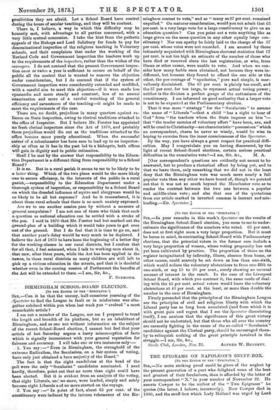THE EPIGRAMS ON NAPOLEON ' S SNUFF-BOX. [To THE EDITOR OF Ins
"SPECTATOR."] STR7—No more striking proof could be given of the neglect by the present generation of a poet who delighted some of the beet and greatest of their forefathers, than is afforded by the letter of your correspondent "X." in your number of November 22. He asserts Cowper to be the author of the "Two Epigrams" he quotes (the latter, I believe, incorrectly). Now Cowper died in 1800, and the snuff-box which Lady Holland was urged by Lord Carlisle (not Moore) to reject was left to her by Napoleon I., whose death took place in 1221 !
May 1 add (what will be obvious to every one conversant with Cowper's life and poems) that the author of
"Forced from home and all its pleasures "
would have been the last person to indulge in the sneer at philan- thropy contained in the second line of the epigram,— "Lady! accept the gift a hero wore, In spite of all this philanthropic stuff, Let not three verses written by a bore Prevent your ladyship from taking snuff," —and that he who wrote the lines beginning,— 4, War is a game which, were their subjects wise, Kings would not play at."
would not have attached any special value to a relic of one of the greatest conquerors whom the world ever suffered from ?
Cowper was himself eminently philanthropic, and had an in- tense aversion to unnecessary wars. In politics he belonged to "the Old Whig" party, was an ardent patriot, and an enthusi- astic admirer of Chatham. I always fancied Byron to be the author of the epigram No. 2. It will be remembered that he had
to good-will towards Lord Carlisle.—I am, Sir, &c., M. D. L.







































 Previous page
Previous page